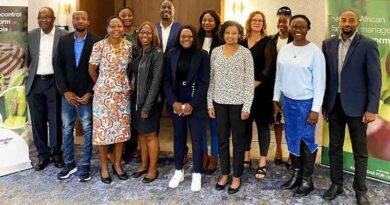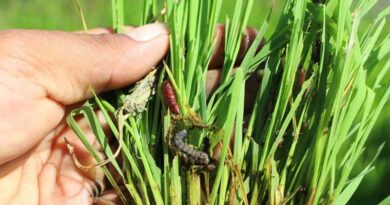CABI hosts first ever youth in agriculture stakeholders networking event in Lusaka, Zambia
25 October 2023, Zambia: The majority of Zambia’s 19.5 million citizens rely upon agriculture for all or part of their livelihoods with the country’s 1.5 million smallholder farmers – of which 20% are headed by women – dominating the sector with maize being the main staple crop.
However, the challenge towards greater profits and food security is heralded upon Zambia’s young population where 82% are under the age of 35. Adding to the pressure on the country’s youth to provide in the agriculture sector is the fact that 15% of 18–24-year-olds – according to 2017 estimates – are unemployed.
This is double the total labour force unemployment figure which the International Labour Organization links to Zambia’s youth having low education and skill levels, as well as skills mismatch and low levels of entrepreneurship.
Constraints to rural youth in agriculture many and varied
This is couple with limited access to appropriate finance, technology and markets, low absorptive capacity of the labour market for new entrants and the concentration of growth in highly capital-intensive and urban based sectors.
To achieve inclusive growth 11.8 million new jobs must be created in Zambia by 2050, most of which will need to be filled by young people. Having young people out of work puts a high cost on the Zambian economy – particularly in agriculture where it contributes 20% to the country’s annual Gross Domestic Product (GDP).
While youth involvement in agriculture is fundamental for economic development and poverty reduction, the significance and constraints associated with rural youth involvement in agriculture are many and varied.
They include poor access to land, finance and production resources, negative personal perceptions about agriculture and aspirations to move away from rural areas as well as inequitable gender dynamics which need to be addressed, especially for developing countries such as Zambia.
Better opportunities for rural women and youth
One of CABI’s goals in the 2023-2025 Medium Term Strategy is to ‘Reduce inequality through better opportunities for rural women and youth.’
To achieve this, CABI seeks to create income generation and employment opportunities for rural women and youth in plant health and agricultural value chains: promoting production, service provision and supporting enterprise development while facilitating smallholder farmers to produce safe, quality high yields.
Deogratius Magero, CABI’s Youth Engagement Manager, Africa, in collaboration with the CABI team in Zambia, held a first ever networking event which brought together over 30 stakeholders in the youth agricultural programming sector.
Form connections for better ways of working together
One of the aims of the networking event was to form connections for better ways of working together within the youth in agriculture ecosystem in the Southern Africa region. This included the use of biological control agents to control pests such as the fall armyworm (Spodoptera frugiperda) in rural Zambia.
The attendees consisted of International development organizations such as Hivos Zambia, GIZ Zambia, youth-led agricultural enterprises including Mulimi Farmers’ Scheme, Hematon Agro, Digital Flash Media Agro Innovations, and the Consortium of African Youth in Agriculture and Climate Change (CAYACC).
Others who attended were Zambia United States Engagement Alumni, Farmer Action on Resilient Cassava Training Project (FARCT), Zambia National Farmers Union – ZNFU, BAYER Zambia, the University of Zambia (UNZA), and the Information and Communications University of Zambia (ICU).
In attendance too were members of the African Women in Agricultural Research and Development, Zambia Chapter (ZaWARD).
Dr Noah Phiri, CABI’s Regional Representative, Southern Africa, welcomed the guests and introduced CABI’s work in the region. He recognized the great work each partner is doing and encouraged partnerships for greater impact in the ecosystem.
Training under PlantwisePlus programme
Mr Magero also shared CABI’s ambition to create income generating opportunities for youth in agriculture – highlighting CABI’s training of youth as agricultural service providers in Kenya and Uganda under the PlantwisePlus programme.
He recognized the great work that youth-led agricultural enterprises present were doing in demonstrating the potential of agriculture as a source of livelihoods for young people. He further invited the guests to utilize the event to connect with each other and identify areas of synergy for partnerships on youth in agriculture.
Representatives from GIZ Zambia and Hivos Zambia encouraged the young people present to embrace agriculture as sustainable source of livelihoods. They challenged them to design innovative solutions to address agricultural problems and boldly seek financial support from development organizations and government.
Zindaba Hanzala, former Miss Zambia and founder of the Mulimi Farmers’ Scheme, said, “I have never regretted since I started my agricultural business. Every day I think, dream, sleep and wake up to agriculture.’’
She further encourages young people to take up the challenge of starting agribusinesses instead of “just seeking for white collar jobs which are very limited.”
Engagement with private sector players
Meanwhile, a representative from Bayer encouraged young people present to engage with private sector players to enable them to find markets for their agricultural produce such as certified seeds. She further invited them to consider Bayer as a partner in production and marketing of certified seeds.
Kelly Mwaba, Head of Membership, Services, and Communication at Zambia National Farmers Union encouraged young people to form new or join existing farmers associations within their districts to better benefit with support from relevant development and government agencies.
Mr Magero said, “CABI seeks to establish strategic partnerships that will foster creation of income generation opportunities for youth in agriculture and challenge negative perceptions that limit their engagement.
“This pioneering networking event was a first and we hope to do more in convening strategic players at different levels for such partnerships to come to fruition.’’
Also Read: Innovative Label Design: Revolutionizing Agrochemical Packaging in India
(For Latest Agriculture News & Updates, follow Krishak Jagat on Google News)















